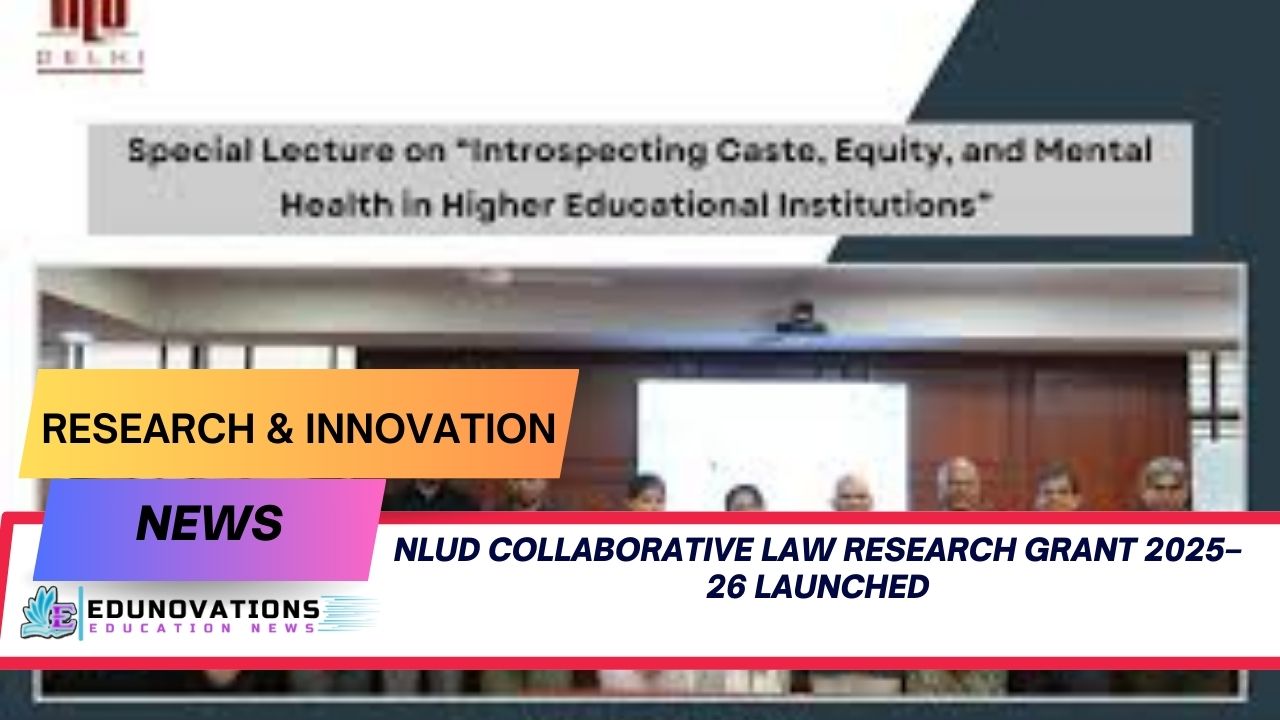Discover NLUD’s groundbreaking ARC Grant 2025–26 — a ₹ 7.5-lakh multi-institutional research grant for law and social science faculty. Learn how to apply.
NLUD Launches Collaborative Law Research Grant with ₹ 7.5 Lakh Funding
National Law University, Delhi (NLUD) has rolled out its highly anticipated NLUD collaborative law research grant 2025–2026, called the ARC (Advancing Research through Collaboration) Grant, to stimulate interdisciplinary, multi-institutional socio-legal scholarship. The new initiative is backed by a detailed brochure that spells out the university’s ambitions, eligibility criteria, thematic areas, and application process.
This NLUD collaborative law research grant 2025–2026 aims to bring together legal scholars, social scientists, and researchers across institutions to explore pressing issues such as law and technology, environmental justice, citizenship, discrimination, and more.
Purpose and Vision of the Grant
The NLUD ARC Grant is designed to:
- Fund multi-institutional collaborative projects in socio-legal research.
- Encourage interdisciplinary engagement, especially bridging law with social sciences and other fields.
- Support topics that combine broad social relevance with legal scholarship: from law and technology to environment & sustainable development, pluralism, identity, market governance, and legal education (as outlined in the ARC Grant Brochure).
- Build research capacity and produce scholarship that has real-world policy impact.
By doing so, NLUD hopes to nurture a research ecosystem where faculty from different institutions can pool their expertise, address complex challenges, and generate rigorous, publishable outputs.
Grant Details & Financial Support
Under this NLUD ARC Grant, successful applicants will receive:
- A funding quantum of ₹ 7.5 lakh per project.
- Grant duration of one year, ensuring a focused but meaningful timeline.
- Disbursement in three tranches, which helps in project planning and execution.
The funds are intended to cover key project costs, but not all expenses are eligible. For example, foreign travel may be restricted, and human resources costs are capped (as per the detailed budget guidelines in the brochure).
Who Can Apply: Eligibility Criteria
Eligibility for the NLUD ARC Grant is carefully calibrated to ensure qualified and impactful research:
- Faculty members from law schools or social sciences departments at recognized institutions are eligible.
- Applicants must have a record of publications, preferably indexed in SCOPUS or Web of Science, to demonstrate research capability.
- The proposal should be multi-institutional, meaning there should be more than one institution involved, promoting collaboration.
- Each proposal requires a well-defined research plan, including:
- A CV of each proposer.
- A research proposal (~2,500 words), laying out objectives, methodology, and significance.
- A progress milestones document (~1,500 words) outlining deliverables for the year.
- A detailed budget, aligned with the grant’s financial rules.
Applications are typically evaluated based on academic merit, feasibility, innovation, and relevance to the thematic areas defined in the brochure.
Thematic Focus Areas
NLUD has identified a wide set of research themes for the grant, reflecting its commitment to socially relevant scholarship. Some of these include:
- Law & Technology – exploring issues like AI regulation, data governance, cyber laws.
- Environment & Sustainable Development – legal frameworks for climate justice, ecological governance.
- Women, State & Judicial Approaches – gender, legal reform, access to justice.
- Labour & Market Governance – labour rights, regulation, economic justice.
- Citizenship, Discrimination & Identity – caste, pluralism, marginalization.
- Spatiality & Exclusion – urban planning, displacement, land rights.
- Degrowth & Legal Reform – rethinking growth, sustainability.
- Legal Education & Pluralism – pedagogical innovations, normative diversity.
These thematic areas reflect some of the most urgent socio-legal challenges, positioning NLUD to contribute significantly to both academic knowledge and public policy.
Selection Process & Reporting Requirements
The selection process for the NLUD ARC Grant involves:
- Expert Review Panel: Applications are evaluated by a panel of domain experts, assessing the academic rigor and feasibility.
- Shortlisting & Interview: Selected teams may be invited for a discussion or interview to clarify their proposal.
- Final Approval: The grant is awarded to those whose proposals align strongly with the grant’s objectives and university priorities.
Once awarded, researchers must adhere to reporting obligations:
- Bi-monthly progress reports: Status updates on deliverables and milestones.
- Final project report: At the end of the year, a comprehensive report evaluating the research outcomes.
- Publication requirement: Preference for outputs in Scopus or WoS journals; could also include policy briefs, blog pieces, or other dissemination formats.
- Certificate: Upon completion, NLUD issues a certificate validating the project and its outcomes.
These reporting requirements ensure accountability, help NLUD track impact, and encourage timely dissemination of findings.
Why This Grant Matters
1. Boost to Socio-Legal Scholarship
This NLUD collaborative law research grant 2025–2026 opens an important funding window for socio-legal researchers, particularly in India. Law faculty often struggle to find project-based funds, especially for interdisciplinary and empirical research. NLUD’s grant can help fill this gap.
2. Encouraging Multi-Institutional Collaboration
By mandating multi-institutional proposals, the grant breaks silos — fostering partnerships between law schools, social sciences departments, and other institutions. This kind of cross-pollination can lead to richer, more nuanced research outcomes.
3. Real-World Impact
Given the thematic priorities (e.g., environment, identity, technology), the research supported by this grant has direct relevance to policy debates, litigation, governance, and societal change.
4. Building Research Capacity
For many early- and mid-career academics, receiving funding and recognition from NLUD not only enhances their research profile, but also strengthens institutional capacities — enabling more sustained engagement in scholarship.
Expert Voices & Context
Legal education experts have emphasized the importance of funding models like ARC to rejuvenate academic research in Indian law schools. According to an analysis in NLUD’s own self-study report, the university’s Academic and Research Planning Department (ARPD) is actively working “to execute the University’s vision as a research-based Higher Education Institution … through grants, fund-raising, and partnerships.”
Furthermore, NLUD’s commitment to interdisciplinary work is reflected in MoUs it has signed — for instance, with the Indian Institute of Technology (IIT) Delhi — to explore intersections of law, social sciences, and technology.
Beyond NLUD, other premier law schools are also encouraging research grants. For example, the National Law School of India University (NLSIU) offers research fellowships focused on “law and artificial intelligence,” climate justice, and data governance. These trends show a growing recognition of interdisciplinary socio-legal work.
How to Apply: Step-by-Step Guide
Here’s a simplified roadmap for prospective applicants:
- Read the NLUD ARC Grant Brochure carefully: Understand all eligibility criteria, thematic priorities, and budget rules.
- Form a collaborative team: Identify partner institutions, co-investigators, and write a joint proposal.
- Prepare your research proposal (~2,500 words): Define objectives, methodology, significance, and expected outputs.
- Draft progress milestones (~1,500 words): Set quarterly or bi-monthly deliverables, responsible persons, and timeline.
- Create a budget: Use the grant’s guidelines. Make sure human resource costs or travel are within caps.
- Compile CVs and publication lists: Highlight SCOPUS/WoS publications if available.
- Submit the application by the deadline: Ensure all documents are complete and accurate.
- Prepare for interview (if shortlisted): Be ready to defend your idea, explain the methodology, and answer questions on feasibility.
- If selected, manage your project: Stick to reporting deadlines, keep your deliverables on track, and plan for dissemination.
- Publish and share: Aim for high-quality academic output; also consider policy briefs or blogs for wider reach.
Leveraging the Grant for Academic Growth
Here are ways how winning this grant can benefit researchers and institutions:
- Enhanced publication prospects: The grant encourages publishing in high-impact journals — a boost for career growth.
- Stronger institutional reputation: Multi-institutional projects raise the visibility of participating institutions.
- Network building: Teaming up with scholars across institutions fosters new academic partnerships and future collaborations.
- Policy engagement: Research findings can feed into public policy, help shape debates, or inform legal reform.
- Capacity building: The experience helps junior faculty learn grant writing, project management, and interdisciplinary research.
Potential Challenges & Mitigation
While the grant is promising, some challenges may arise:
- Resource constraints: Smaller institutions may struggle to match the grant’s expectations or manage administrative overhead.
Mitigation: Build a realistic budget, assign clear roles, and include administrative support in your proposal. - Time management: Completing a full-year project with deliverables may be tight.
Mitigation: Use the milestone document strategically — break deliverables into manageable chunks. - Publication risk: Not all projects may convert into journal articles.
Mitigation: Plan for alternative outputs (policy briefs, blogs) and set realistic targets. - Reporting burden: Bi-monthly reports and final reporting require administrative efficiency.
Mitigation: Assign a project coordinator or designate someone responsible for tracking and reporting.
Conclusion
The NLUD collaborative law research grant 2025–2026 represents a major milestone for socio-legal scholarship in India. With ₹ 7.5 lakh support, a strong emphasis on interdisciplinary themes, and a collaborative, transparent process, NLUD is laying the groundwork for impactful, policy-relevant research.
For academics in law and social science, this is a powerful opportunity — not just for funding, but for building partnerships, publishing high-quality work, and contributing to the public good. If you are eligible, preparing a strong proposal now could set you on the path to becoming part of NLUD’s research legacy.
Toppers Use Mind Maps to score more than 95%
NCERT Class 11th Commerce Mind Maps
Add to cartOriginal price was: ₹999.00.₹199.00Current price is: ₹199.00.NCERT Class 12th Chemistry Mind Maps
Add to cartOriginal price was: ₹199.00.₹75.00Current price is: ₹75.00.NCERT Class 12th Commerce Mind Maps
Add to cartOriginal price was: ₹999.00.₹199.00Current price is: ₹199.00.NCERT Class 12th Science Mind Maps
Add to cartOriginal price was: ₹999.00.₹199.00Current price is: ₹199.00.NCERT Mind Maps For Class 10th
Add to cartOriginal price was: ₹999.00.₹199.00Current price is: ₹199.00.
Purchase Today
FAQs
- What is the NLUD collaborative law research grant 2025–2026?
It is the ARC (Advancing Research through Collaboration) Grant by NLUD, offering ₹ 7.5 lakh for one-year multi-institutional socio-legal research projects. - Who can apply for NLUD ARC Grant?
Faculty members from law schools or social sciences departments with a track record of publications (ideally in SCOPUS or WoS) are eligible. - What thematic areas are covered by this grant?
Themes include law & technology, environment & sustainable development, citizenship, labour rights, identity, legal education, and more. - What is the application process for this research grant?
Applicants must submit a 2,500-word research proposal, a 1,500-word milestones document, CVs, and a detailed budget. - How is the ₹ 7.5 lakh grant disbursed?
The grant is disbursed in three tranches over the one-year duration. - Are multi-institutional projects mandatory?
Yes, the grant requires collaboration between different institutions to encourage interdisciplinary research. - What are the reporting requirements?
Recipients need to submit bi-monthly progress reports and a final project report, and aim for a published output. - Can foreign travel be funded through this grant?
The brochure places restrictions on certain costs, so applicants need to check the budget rules carefully. - What are the possible outputs from the research?
Outputs may include peer-reviewed journal articles, policy briefs, blogs, and certificates from NLUD. - How will receiving this grant benefit researchers?
It supports high-quality scholarship, builds research networks, enhances publication potential, and enables policy engagement.














